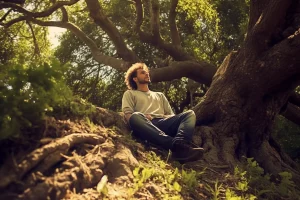Anxiety, a feeling of worry, unease, or nervousness, is something that nearly everyone experiences at some point. It is a natural response to stressful situations and can even be beneficial in certain circumstances. However, when anxiety becomes a constant presence, it can interfere with daily life and overall well-being. This article will explore five essential exercises that can help manage and reduce anxiety symptoms. These exercises don’t involve medication and are focused on promoting mental well-being through physical activity, mindfulness, and relaxation techniques.
1. Aerobic Exercise: Physical Activity for a Healthy Mind
The first exercise on our list is not a specific one but a category: aerobic exercises. This includes activities like brisk walking, jogging, swimming, cycling, and dancing. The benefits of aerobic exercise for mental health are plentiful.
Studies have shown that regular aerobic exercise can decrease overall levels of tension, elevate and stabilize mood, improve sleep, and enhance self-esteem. Even five minutes of aerobic exercise can stimulate anti-anxiety effects. This is due to the release of endorphins, the body’s natural painkillers and mood elevators, and the decrease in stress hormones like cortisol and adrenaline.
Starting a new exercise routine can be daunting, but it doesn’t have to be. Aim for at least 30 minutes of moderate-intensity exercise most days of the week. However, remember, anything is better than nothing; even a 10-minute walk can help clear the mind and reduce anxiety.
2. Yoga: A Blend of Physical Movement and Mindful Breathing
Yoga, a mind-body practice that combines physical postures, breathing exercises, and meditation, is another effective way to reduce anxiety. Yoga encourages relaxation and improves physical and mental balance. It provides an opportunity to tune into your body, align your breath with movement, and leave the chaos of the world behind you.
Several yoga styles are suitable for beginners and those specifically aimed at reducing anxiety, such as Hatha yoga and Restorative yoga. Hatha yoga is gentle and slow-paced, perfect for beginners or those looking for a more relaxed style of yoga. Restorative yoga focuses on physical and mental relaxation through passive stretching.
No matter the style of yoga you choose, the primary goal is to create a sense of peace and calm, both physically and mentally. If you’re new to yoga, consider joining a class or following along with online videos.
3. Tai Chi: The Art of Moving Meditation
Tai Chi, often referred to as “moving meditation,” is a mind-body practice that originated in ancient China. This low-impact, slow-motion exercise involves performing a series of movements in a slow, focused manner, accompanied by deep breathing.
Research suggests that Tai Chi can have numerous mental health benefits, including reducing anxiety. It combines elements of mindfulness and movement, allowing you to focus on your body rather than worrying thoughts.
To start practicing Tai Chi, you might find a local class or follow an instructional video online. Like yoga, Tai Chi is a skill that deepens over time, and the more you practice, the more you’ll experience its calming effects.
4. Guided Imagery: Harnessing the Power of the Mind
Guided imagery is a powerful technique that involves envisioning a particular, peaceful scene or series of experiences. This mental exercise utilizes the mind-body connection, influencing physical states through relaxation and focus.
The process can be guided by a professional, or you can do it independently using scripts or apps. By mentally visiting a peaceful place, you can promote mental calmness and physical relaxation, which can help manage anxiety.
5. Mindfulness Meditation: Cultivating Presence
Mindfulness meditation is a practice focused on developing a non-judgmental awareness of our thoughts, feelings, and sensations in the present moment. Studies have shown that mindfulness can reduce anxiety and improve mental health. It teaches us to identify anxious thoughts and feelings, observe them without judgment, and let them go without being overwhelmed.
To start practicing mindfulness meditation, choose a quiet and comfortable place where you won’t be disturbed. Start with just five minutes a day, gradually increasing as you become more comfortable with the practice. Sit in a comfortable position, close your eyes, and focus on your breath. When your mind starts to wander (and it will), gently bring your attention back to your breath.
Mindfulness is not about clearing the mind but about noticing the thoughts and then letting them go. It’s about being present in the moment, rather than worrying about the past or the future, which is often where anxious thoughts reside.
Conclusion
Anxiety can be a challenging and sometimes debilitating condition, but there are many strategies available to help manage it. These five exercises—Aerobic exercise, Yoga, Tai Chi, Guided Imagery, and Mindfulness Meditation—provide a broad toolkit that can be used to actively fight anxiety.
Remember, the key is consistency. It’s not about perfect execution but about regular practice. Over time, these exercises can help reduce anxiety and improve mental well-being. However, if you find that your anxiety is overwhelming or preventing you from living your life, don’t hesitate to seek professional help. Mental health professionals can provide additional tools and strategies, as well as essential support.
Anxiety can be a formidable foe, but by actively engaging in exercises such as these, you can regain control and live a calmer, more peaceful life.



